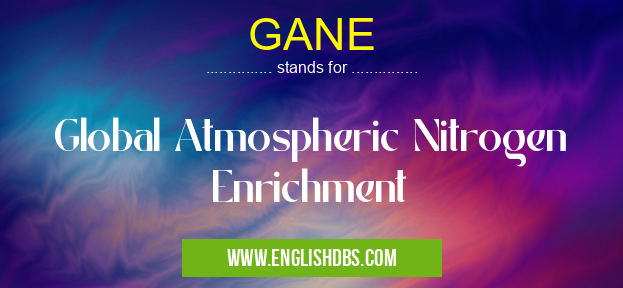What does GANE mean in UNCLASSIFIED
Global Atmospheric Nitrogen Enrichment (GANE) refers to the ongoing increase in the concentration of reactive nitrogen compounds in the Earth's atmosphere. This enrichment is primarily driven by human activities, such as the combustion of fossil fuels, industrial processes, and agricultural practices.

GANE meaning in Unclassified in Miscellaneous
GANE mostly used in an acronym Unclassified in Category Miscellaneous that means Global Atmospheric Nitrogen Enrichment
Shorthand: GANE,
Full Form: Global Atmospheric Nitrogen Enrichment
For more information of "Global Atmospheric Nitrogen Enrichment", see the section below.
Causes of GANE
- Fossil Fuel Combustion: The burning of fossil fuels, such as coal, oil, and natural gas, releases nitrogen oxides (NOx) into the atmosphere. These oxides react with other atmospheric components to form nitrogen dioxide (NO2) and nitric acid (HNO3).
- Industrial Processes: Certain industrial activities, such as the production of fertilizers and plastics, also emit significant amounts of NOx and ammonia (NH3).
- Agricultural Practices: Agricultural activities, such as the use of nitrogen-based fertilizers, contribute to GANE through the release of NH3 and nitrous oxide (N2O).
- Natural Sources: Natural processes, such as lightning and microbial activity, also contribute to atmospheric nitrogen enrichment, but to a lesser extent than human activities.
Consequences of GANE
GANE has far-reaching consequences for the environment and human health:
- Air Pollution: NOx and HNO3 contribute to air pollution, causing respiratory problems and cardiovascular diseases.
- Water Quality: Nitrogen compounds can leach into waterways, leading to algal blooms and eutrophication, which depletes oxygen levels and harms aquatic ecosystems.
- Greenhouse Gas Emissions: N2O is a potent greenhouse gas, contributing to climate change.
- Soil Acidification: Nitrogen deposition can acidify soils, reducing soil fertility and affecting plant growth.
- Biodiversity Loss: Nitrogen enrichment can alter ecosystem dynamics, leading to the decline or displacement of certain species.
Mitigation Measures
To mitigate the effects of GANE, several measures can be implemented:
- Clean Energy Sources: Transitioning to renewable energy sources, such as solar and wind power, can reduce NOx emissions from fossil fuel combustion.
- Emission Reduction Technologies: Industries can adopt technologies to capture and reduce NOx and NH3 emissions from their processes.
- Sustainable Agriculture Practices: Implementing precision farming techniques and using more efficient fertilizer application methods can minimize nitrogen losses from agricultural fields.
- Forest Conservation and Reforestation: Forests act as natural sinks for nitrogen compounds, so preserving and restoring forests can help mitigate GANE.
Essential Questions and Answers on Global Atmospheric Nitrogen Enrichment in "MISCELLANEOUS»UNFILED"
What is Global Atmospheric Nitrogen Enrichment (GANE)?
GANE refers to the substantial increase in the levels of nitrogen compounds in the Earth's atmosphere. It primarily results from human activities, such as the burning of fossil fuels, agriculture, and industrial processes.
What are the major sources of GANE?
The primary sources of GANE include nitrogen oxides (NOx) from vehicle exhaust and power plants, ammonia (NH3) from intensive agriculture, and nitrous oxide (N2O) from microbial processes in soils and oceans.
How does GANE impact the environment?
GANE can lead to various environmental consequences, including:
- Eutrophication of water bodies, causing algal blooms and oxygen depletion.
- Increased greenhouse gas emissions, particularly N2O.
- Reduced biodiversity and species loss.
- Soil acidification and nutrient imbalances.
What measures can be taken to mitigate GANE?
Mitigation strategies for GANE involve:
- Improving vehicle and power plant emissions efficiency.
- Optimizing fertilizer use and managing livestock waste.
- Promoting sustainable agricultural practices and reducing deforestation.
- Developing and implementing carbon capture and storage technologies.
How does GANE affect human health?
High levels of nitrogen oxides (NOx) in the atmosphere can contribute to respiratory problems, such as asthma and bronchitis. Ammonia and nitrogen deposition can also affect human health by reducing visibility and contributing to the formation of particulate matter.
Final Words: GANE is a significant environmental issue with far-reaching consequences for human health and ecosystems. Understanding the causes and effects of GANE is crucial for developing effective mitigation strategies and promoting sustainable practices to minimize its impacts on the environment and human well-being.
